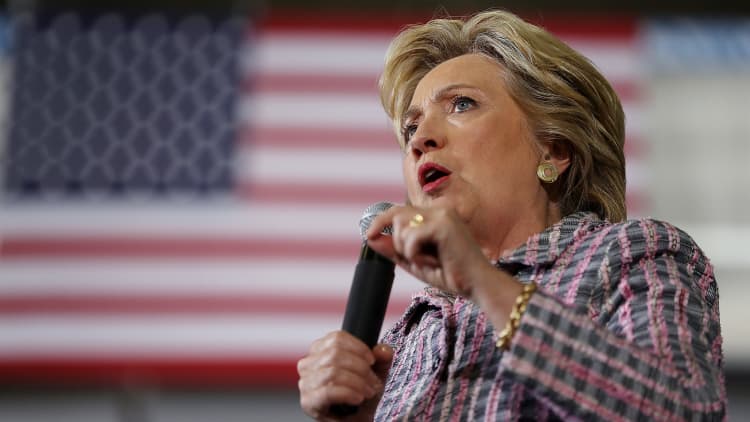
The noose around Wall Street's neck is likely to tighten, no matter who is elected president.
Recent events have only increased the possibility that any hopes for banking regulatory relief are likely to go unfulfilled when the nation's 45th president takes office next January.
Deutsche Bank's capital crunch has rekindled fears over too-big-to-fail financial institutions. At the same time, Wells Fargo's illegal sales practices have stirred memories of big banks duping unwitting customers during the subprime mortgage boom.
What it likely adds up to is a toxic relationship between Wall Street and Washington.
"Look at Wells Fargo," Democratic nominee Hillary Clinton said during a campaign stop Monday as the crowd hissed. "Really shocking, isn't it? One of the nation's biggest banks bullying thousands of employees into committing fraud against unsuspecting customers."
"It is outrageous that eight years after a cowboy culture on Wall Street wrecked our economy, we are still seeing powerful bankers playing fast and loose with the law," she added.
Republican Donald Trump has been less fiery in his rhetoric, in fact pledging to repeal the Dodd-Frank regulations that big banks have cast as the enemy. He has, though, labeled Wells Fargo as "stupid" and "greedy." He has avoided the Deutsche Bank issue; multiple press reports indicate that he has done considerable business with the German lender.
However, Trump is unpredictable, and analysts see potential hazards to the Street from either candidate. Neither campaign responded to requests for comment.
"The financial services industry heads into the 2016 election in a precarious position," analysts Edward Mills and Ian Swanberg at investment bank FBR Capital Markets said in a note. "In years past, we could more easily break down the positive or negative impact of one candidate or one party winning the election. This year is different."
FBR compiled a scorecard breaking down how Clinton and Trump would treat various subsectors within the banking industry.
Clinton is considered positive for community and regional banks and housing, mixed for insurance companies, investment banks and broker dealers, and negative for money center banks, asset managers and student lenders. She's likely to defend and strengthen Dodd-Frank, push new regulations for nonbank "shadow" lenders, and seek a fee for risky Wall Street activities.
Trump scores positive for community/regional banks, asset managers, broker dealer and student lenders and mixed for all the others. In addition to repealing Dodd-Frank, he's likely to slap a halt to all new regulations, close some tax loopholes and possibly try to influence Federal Reserve policymaking, according to the analysis.
The FBR analysts also try to game who will become Treasury secretary, assuming Jack Lew is not brought back.
Though BlackRock CEO Larry Fink has openly stated a desire to hold the Cabinet post in a Clinton administration, FBR considers current front-runners to be current deputy secretary Sarah Bloom Raskin and Fed Gov Lael Brainard. Trump's likely pick would be his campaign finance chair Steven Mnuchin, according to FBR.


